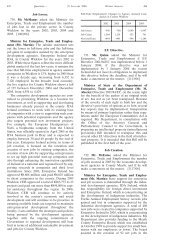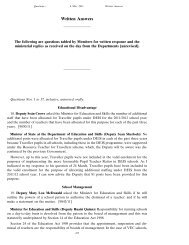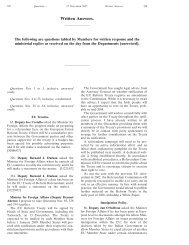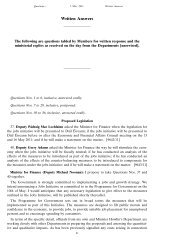Written Answers. - Parliamentary Debates - Houses of the Oireachtas
Written Answers. - Parliamentary Debates - Houses of the Oireachtas
Written Answers. - Parliamentary Debates - Houses of the Oireachtas
- No tags were found...
You also want an ePaper? Increase the reach of your titles
YUMPU automatically turns print PDFs into web optimized ePapers that Google loves.
415 Questions— 22 February 2005. <strong>Written</strong> <strong>Answers</strong> 416[Mr. Eamon Ryan.]priority aid countries <strong>of</strong> <strong>the</strong> EPAs; and if he willmake a statement on <strong>the</strong> matter. [6024/05]191. Mr. Eamon Ryan asked <strong>the</strong> Minister forForeign Affairs <strong>the</strong> details <strong>of</strong> any EPA impactassessments on Irish priority aid countries, that is,<strong>the</strong> level <strong>of</strong> unemployment expected, <strong>the</strong> nature<strong>of</strong> industries to be adversely affected and <strong>the</strong>capacity <strong>of</strong> <strong>the</strong>se countries to adjust to EU competitionwithin <strong>the</strong> transition period; and if he willmake a statement on <strong>the</strong> matter. [6025/05]192. Mr. Eamon Ryan asked <strong>the</strong> Minister forForeign Affairs <strong>the</strong> communications, meetingsand o<strong>the</strong>r representations his Department hashad with <strong>the</strong> Department <strong>of</strong> Enterprise, Tradeand Employment on <strong>the</strong> liberalisation <strong>of</strong> marketsunder <strong>the</strong> proposed EPAs; and if he will make astatement on <strong>the</strong> matter. [6026/05]193. Mr. Eamon Ryan asked <strong>the</strong> Minister forForeign Affairs <strong>the</strong> concerns his Department hasraised with <strong>the</strong> Department <strong>of</strong> Enterprise, Tradeand Employment over <strong>the</strong> opening up <strong>of</strong> prioritycountry markets to EU competition; and if he willmake a statement on <strong>the</strong> matter. [6027/05]194. Mr. Eamon Ryan asked <strong>the</strong> Minister forForeign Affairs <strong>the</strong> areas <strong>of</strong> priority countrymarkets his Department has suggested should beexcluded from liberalisation, in EU and interdepartmentalmeetings; and if he will make astatement on <strong>the</strong> matter. [6028/05]195. Mr. Eamon Ryan asked <strong>the</strong> Minister forForeign Affairs his views on <strong>the</strong> regional groupingsrequired under EPAs; his views on <strong>the</strong> factthat Zambia is forced by this process to decidebetween SADC and COMESA, two regionalgroupings in which it has invested years <strong>of</strong>energy; and if he will make a statement on <strong>the</strong>matter. [6029/05]196. Mr. Eamon Ryan asked <strong>the</strong> Minister forForeign Affairs his views on criticisms that, with<strong>the</strong> EPAs, <strong>the</strong> EU is bringing about an effectiveredrawing <strong>of</strong> <strong>the</strong> economic map <strong>of</strong> Africa; and ifhe will make a statement on <strong>the</strong> matter.[6030/05]Minister <strong>of</strong> State at <strong>the</strong> Department <strong>of</strong> ForeignAffairs (Mr. C. Lenihan): I propose to take QuestionNos. 188 to 196, inclusive, toge<strong>the</strong>r.The legally binding Cotonou Agreementbetween <strong>the</strong> African, Caribbean and Pacific,ACP, states and <strong>the</strong> European Union providesfor <strong>the</strong> negotiation <strong>of</strong> economic partnershipagreements, EPAs, between <strong>the</strong> parties. Sincetrade is a European Community competence, <strong>the</strong>European Commission negotiates <strong>the</strong> EPAsbetween <strong>the</strong> EU and six regional groupings <strong>of</strong>ACP states on behalf <strong>of</strong> <strong>the</strong> member states. TheCommission provides member states with regularupdates on <strong>the</strong> progress <strong>of</strong> <strong>the</strong> negotiations. TheEPAs are to enter into force by 1 January 2008.The EPAs are first and foremost instrumentsfor development that will foster <strong>the</strong> smooth andgradual integration <strong>of</strong> ACP states into <strong>the</strong> worldeconomy with due regard for <strong>the</strong>ir politicalchoices and development priorities, <strong>the</strong>reby promoting<strong>the</strong>ir sustainable development and contributingto poverty eradication in <strong>the</strong> ACP countries.They combine trade and wider developmentissues in a unified framework while takingaccount <strong>of</strong> <strong>the</strong> specific economic, social andenvironmental circumstances <strong>of</strong> each regionalgroup and its component states. By enlargingACP markets through regional integration and bymaking regulatory frameworks in <strong>the</strong>se countriesmore transparent, EPAs can create an environmentconducive to <strong>the</strong> private sector and thusfunction as a vehicle for long-term economicdevelopment.According to Article 37(7) <strong>of</strong> <strong>the</strong> CotonouAgreement, <strong>the</strong> negotiations on <strong>the</strong> EPAs:shall take account <strong>of</strong> <strong>the</strong> level <strong>of</strong> developmentand <strong>the</strong> socio-economic impact <strong>of</strong> trademeasures on ACP countries, and <strong>the</strong>ir capacityto adapt and adjust <strong>the</strong>ir economies to <strong>the</strong> liberalisationprocess. Negotiations will <strong>the</strong>reforebe as flexible as possible in establishing <strong>the</strong>duration <strong>of</strong> a sufficient transitional period, <strong>the</strong>final product coverage, taking into account sensitivesectors, and <strong>the</strong> degree <strong>of</strong> asymmetry interms <strong>of</strong> timetable for tariff dismantlement,while remaining in conformity with WTO rules<strong>the</strong>n prevailing.While Ireland, like <strong>the</strong> o<strong>the</strong>r member states, doesnot participate in <strong>the</strong> ongoing EPA negotiations,we are generally satisfied that <strong>the</strong> Commission isdischarging its mandate in accordance with <strong>the</strong>seprovisions <strong>of</strong> <strong>the</strong> Cotonou Agreement. It is clearfrom <strong>the</strong> most recent EU-ACP joint report <strong>of</strong>October last on <strong>the</strong> state <strong>of</strong> play <strong>of</strong> regional EPAnegotiations that <strong>the</strong> process with <strong>the</strong> six regionsis conducted with considerable concern for itsimpact on <strong>the</strong> economies <strong>of</strong> <strong>the</strong> ACP countries.As in all trade negotiations, <strong>the</strong> EPA negotiationhas brought to light differences <strong>of</strong> approachbetween <strong>the</strong> parties in a number <strong>of</strong> areas. It is tobe hoped that as <strong>the</strong> talks progress, <strong>the</strong>se divergencescan be resolved in accordance with <strong>the</strong>principles and objectives underlying <strong>the</strong> negotiations.However, it is not helpful for <strong>the</strong> success<strong>of</strong> <strong>the</strong> EPA project at this stage to suggest takingaction at <strong>the</strong> WTO for a continuation beyond2008 <strong>of</strong> <strong>the</strong> preferential access <strong>of</strong> ACP countriesto EU markets.All <strong>the</strong> programme countries in Ireland’s bilateralaid programme — Ethiopia, Lesotho, Mozambique,Tanzania, Uganda, Zambia and Timor-Leste — are ACP states. Our underlyingapproach in those countries is complementary tothat <strong>of</strong> <strong>the</strong> EPAs in that we are sensitive to <strong>the</strong>need to help build <strong>the</strong> economic architecture in<strong>the</strong>se least developed countries so that <strong>the</strong>y willbe able to avail <strong>of</strong> an improving internationaltrading environment. To that end, Ireland worksboth with its partner governments and with o<strong>the</strong>rdonor countries to ensure a real focus on economicdevelopment and employment generation











![[Deputy Michael Noonan.]](https://img.yumpu.com/30494839/1/190x245/deputy-michael-noonan.jpg?quality=85)




